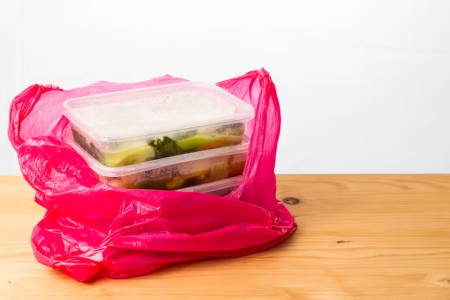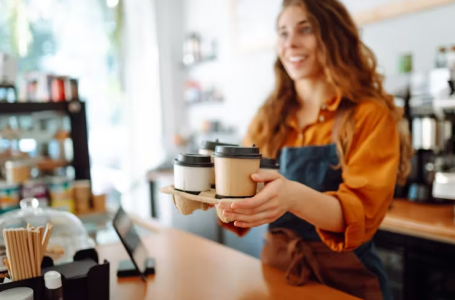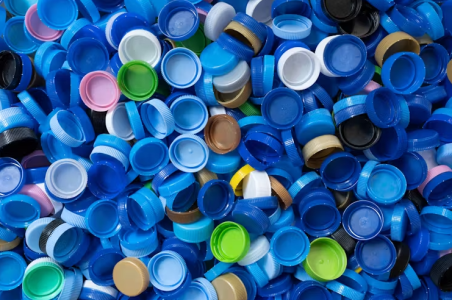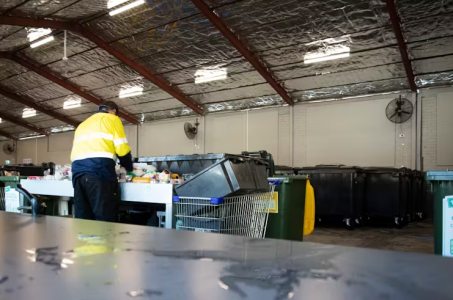Can a pizza box go in the yellow bin – or not? An expert answers this and other messy recycling questions
- Replies 7
Have you ever gone to toss something into the recycling bin – a jam jar, a pizza box, a takeaway container encrusted with yesterday’s lunch – and wondered if you’re doing it right? Perhaps you asked yourself: should I scrub the jar with hot water? Scrape the mozzarella off the box? Wash off that palak paneer?
Research shows most Australians believe they are good recyclers. But only 25% of people separate waste correctly and up to 35% of recycling goes to landfill unnecessarily. And one in four Australians tends not to rinse or empty food containers before sending them to the bin.
The problem is not helped by different recycling practices between councils, which causes public confusion.
So just how well does recycling need to be rinsed? What should you do with your plastic lids and pizza boxes? And will robots one day work it all out for us?

One in four Australians tends not to rinse or empty food containers before recycling them. ThamKC/Shutterstock
The problem of contamination
Mechanical recycling methods – such as shredding and melting – struggle to operate when food and other residues are present.In fact, one spoiled item might ruin the entire cycling batch. Queensland’s Goondiwindi Regional Council, for example, said nearly a quarter of its kerbside recyclables collected in 2022–23 was contaminated and sent to landfill.
Some councils use “advanced materials recovery” that can tolerate lightly soiled recyclables. These facilities use mechanical and automated sorting processes, including optical sorters and artificial intelligence.
But other councils still rely on human sorting, or basic mechanical systems, which require items to be relatively clean.
Be a tip-top recycler
While local recycling capabilities come into play, as a general rule, rinse containers when you can. As well as avoiding contamination, it helps reduce smells and keep bins clean.The best pre-cleaning method for recycling depends on the type of packaging.
Paper and cardboard: these items must be clean and dry – no exceptions. Paper and cardboard absorbs contamination more than other materials. So if it gets wet or greasy, it can’t be recycled – though it may be compostable.
So for pizza boxes, for example, recycle the clean parts and bin the parts that are greasy or have food stuck to them.
Unfortunately, traditional cardboard coffee cups are not usually recyclable in Australia. That’s because the plastic lining inside is bonded tightly to the paper, making it difficult to separate during standard paper recycling.
However in some areas, programs such as Simply Cups collect coffee cups and recycle them into sustainable products such as asphalt, concrete and building products.
And in some states, such as South Australia and Western Australia, single-use cups lined with polymer are banned and only compostable cups can be used.

The plastic lining in disposable coffee cups is tightly bonded to the paper, making recycling difficult. maxbelchenko/Shutterstock
Glass and metals: these items are washed and processed at extremely high temperatures, so can tolerate a bit of residue. But too much residue can contaminate paper and cardboard in the bin. So rinse glass and plastic to remove visible food and empty liquids. Just a quick rinse is enough – there’s no need to scrub or use hot water.
But not all glass and metals can be recycled. Mirrors and light bulbs, for instance, are treated in such a way that they melt at different temperatures to other glass. So check before you chuck.
Plastics: rinse plastics before putting them in the recycling bin. It’s important to know that the numbers 1 to 7 on plastics, inside a recycling symbol, do not necessarily mean the item can be recycled in your area. The number is a code that identifies what plastic the item is made from. Check if your council can recycle that type of plastic.
Complicating matters further is the question of plastic lids. On this, guidelines differ across Australia, so check your local rules.
Some councils recycle plastic coffee-cup lids while others don’t.
Likewise, the rules on plastic bottle lids differ. Some councils allow bottle-lid recycling, but even then, the processes vary. In the Australian Capital territory, for example, a lid larger than a credit card can be put in the recycling bin, but consumers are asked to remove the lid from the bottle. But Brisbane City Council asks consumers to leave the lids on.
Meanwhile, organisations such as Lids4Kids collect plastic lids and make them into new products.

Some organisations collect plastic lids and make them into new products. Chutima Chaochaiya/Shutterstock
The future of recycling
Recycling methods are evolving.Advanced chemical recycling breaks plastic down into its chemical building blocks. It can process plastic types that traditional methods can’t, such as soft plastics, and turn it into valuable new products.
AI and automation are also reshaping recycling, by improving sorting and reducing contamination. And closed-loop washing systems, which filter and reuse water, can clean lightly soiled recyclables.
Other innovations are emerging, too, such as dissolvable packaging and AI-enabled “smart bins” that might one day identify and sort materials – and maybe even tell consumers if items need rinsing!
And goods can also be “upcycled” into higher value products such as “nanomaterials” or hydrogen.
But upcycling still requires clean, well-sorted streams to be viable. And until all these technologies are widespread, each of us must help keep our recycling systems working well.
This article is republished from The Conversation under a Creative Commons license. Read the original article.









